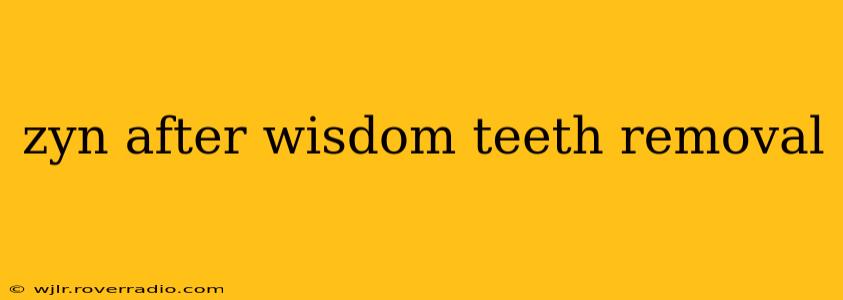Wisdom teeth removal is a common procedure, often followed by a period of recovery involving pain management, dietary restrictions, and careful oral hygiene. Many people turn to nicotine pouches, like Zyn, to help manage discomfort or cope with the post-operative experience. However, using Zyn after wisdom teeth removal presents several potential risks and complications. This article will explore these risks, offer alternative coping mechanisms, and provide a comprehensive understanding of the considerations involved.
Is it Safe to Use Zyn After Wisdom Teeth Removal?
No, using Zyn after wisdom teeth removal is generally not recommended. The primary concern is the impact of nicotine on blood clotting. Nicotine is a vasoconstrictor, meaning it narrows blood vessels. This can impede the healing process by restricting blood flow to the extraction sites, increasing the risk of:
- Dry Socket: This painful complication occurs when the blood clot protecting the extraction site dislodges, exposing the underlying bone and nerve endings. Nicotine's vasoconstrictive effect significantly increases the risk of dry socket.
- Increased Bleeding: While rare, nicotine can interfere with the body's natural clotting mechanisms, potentially leading to increased bleeding or prolonged bleeding at the surgical site.
- Slower Healing: The reduced blood flow caused by nicotine can slow down the healing process, prolonging recovery time and increasing the chance of infection.
- Infection: A compromised healing process makes the area more susceptible to infection.
What are the Alternatives to Zyn for Managing Discomfort?
Fortunately, there are many safer and more effective ways to manage discomfort and cope with the post-operative experience following wisdom teeth removal. These include:
- Prescription Pain Medication: Your oral surgeon will likely prescribe pain relievers like ibuprofen or stronger options if needed. Follow their instructions carefully.
- Over-the-Counter Pain Relievers: Ibuprofen and acetaminophen are effective for managing mild to moderate pain.
- Ice Packs: Applying ice packs to your cheeks can help reduce swelling and pain.
- Saltwater Rinses: Gently rinsing your mouth with warm saltwater can help keep the extraction sites clean and promote healing.
- Soft Foods: Stick to a soft food diet to avoid irritating the surgical sites.
- Rest: Adequate rest is crucial for proper healing.
Can Nicotine Patches Be Used Instead of Zyn?
While nicotine patches might seem like a less invasive alternative to nicotine pouches, they still carry the same risks of interfering with blood clotting and healing. It's crucial to avoid all forms of nicotine after wisdom teeth removal.
What if I'm a Heavy Nicotine User?
If you're a heavy nicotine user, quitting altogether is the best option, especially during your recovery period. Your dentist or oral surgeon can recommend resources and strategies to help you quit smoking or using nicotine products. The benefits of avoiding nicotine during healing far outweigh any perceived short-term relief.
What Should I Do If I Experience Complications?
If you experience excessive bleeding, severe pain, or any signs of infection (such as swelling, pus, or fever) after your wisdom teeth removal, contact your oral surgeon immediately.
This information is for general knowledge and does not constitute medical advice. Always consult your dentist or oral surgeon before making any decisions regarding your post-operative care. They can provide personalized recommendations based on your individual circumstances and health history. Your oral health and well-being are paramount.
